Search
Showing 10 of 1803 results for NARSC 2016 July student registration fees
-
From the Acting CE: Forward together
Tēnā koutou katoa
Last week we took time internally to reflect on our work over the 2023/24 financial year. So much excellent work has happened over the past twelve months – it was wonderful to come together virtually as an organisation to celebrate the achievements.
There are good reasons to celebrate. International students are returning to New Zealand. The latest enrolment figures show that there were 69,135 international student enrolments with New Zealand education providers in 2023. This represents a 67 per cent increase compared to the full year in 2022 and 60 per cent of annual enrolments in 2019.
This is positive news for our education sector and good for our communities.
A key part of our strategy is to partner and connect and to be an enabler of international education for New Zealand, so I thought I would share with you some recent engagements with that in mind.
This past month I had the pleasure of speaking at the opening plenary session of the annual SIEBA (Schools International Education Business Association) conference in Auckland. The theme of the hui was Global Threads Local Ties. The school sector is very important to New Zealand’s international education offering. It is the second largest sub sector after universities, representing about 20 percent of the value of our entire industry and it is where we find the highest economic value and the greatest opportunity to pathway through to other New Zealand providers.
Likewise, in early August I was pleased to welcome to our Wellington office a delegation of twenty indigenous students visiting from the University of Toronto. Canada is one of New Zealand’s closest and longstanding international partners and it is pleasing to see indigenous-to-indigenous cooperation between both countries increasing. We are really noticing growing interest in this overseas as you will read in this article here. - Indigenous Internationalisation a hot topic
Turning our attention to the next 12 months, in June the ENZ Board approved our business plan for this financial year (1 July 2024 to 30 June 2025). The plan has four clear priorities:
-
To grow and diversify the number and value of international students studying with New Zealand
-
Partner and connect to be the trusted voice and enabler of international education for New Zealand
-
To deliver sector growth through services that are valued by the sector, international students and New Zealand Inc partners, and
-
Optimise ENZ to be a more efficient and effective Crown Agency.
When it comes to delivering valued sector services, the upcoming New Zealand International Education Conference (NZIEC KI TUA) in August will be provide an excellent opportunity to come together as a sector to listen, learn, discuss, contribute, and network with specialists and colleagues.
If you haven’t yet registered, I encourage you to check out the conference website. This year it will be held from 6 to 8 August 2024 at Tākina Convention Centre in Wellington.
We have a stellar line up of speakers and it promises to be an engaging and informative event.
Whaowhia te kete mātauranga
Fill the basket of knowledge.
Ngā mihi nui,
Dr Linda Sissons
Acting Chief Executive
Education New Zealand Manapou ki te Ao
-
-
Neuseeland still a popular destination for German High School students
Germany takes the number one spot in all of Europe for the number of international students it sends to New Zealand and the fourth largest in the world for sending high school students after China, Japan, and South Korea. In 2023, 1,417 German students were enrolled at high schools across New Zealand which represented 10% of the total number of school students in the country.
There are positive signs that this number will continue to increase in 2024. 82 high school students were recently farewelled by the New Zealand Ambassador to Germany, Craig Hawke, and Education New Zealand Manapou ki te Ao (ENZ’s) Associate Director of Engagement in Germany, Olga Elli at an event at Frankfurt Main Airport on Sunday 14 July.
The event was organised by Study Nelson, a Nelson-based education agency, that supports German students to find a high school in New Zealand, mainly in the Nelson-Marlborough area. The event was an opportunity for the students, aged between 14 and 19, to meet and engage with each other before they embark on their international study adventure. The students will spend between three and 18 months in New Zealand, depending on their programme and some plan to complete their NCEA Level 3 university entrance here.
One particularly excited member of the group included Emely Soffel, the I AM NEW scholarship winner from 2019, who due to the pandemic, had to wait five years to make her New Zealand study abroad dream come true.
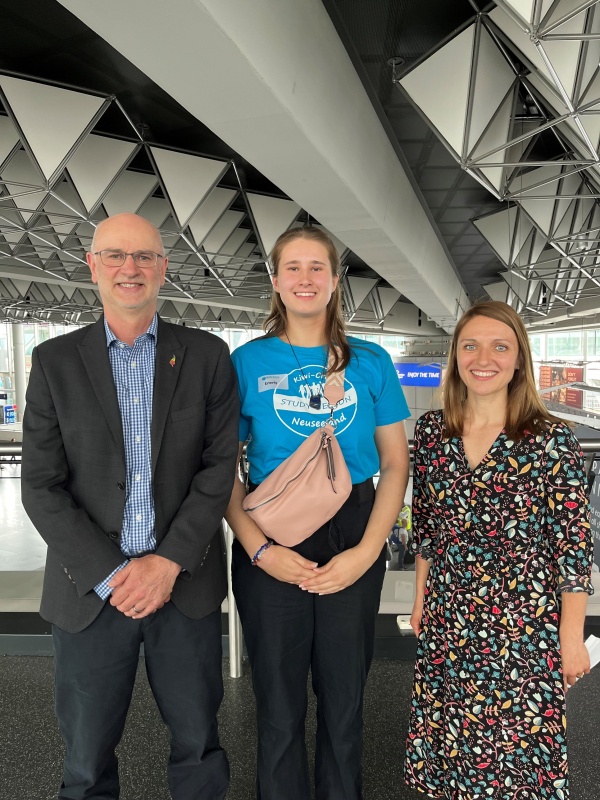
Ambassador Hawke with high school student Emely Soffel, the 2019 I AM NEW scholarship winner who was not able to travel during Covid. They are pictured here with ENZ’s Associate Director of Engagement in Germany, Olga Elli.
Olga said that Germany’s strong recovery in the high school subsector can be attributed to the experienced German agent network who have had long-standing and enduring relationships with high schools back in New Zealand.
“These agents have been building strong bridges between Germany and New Zealand for several years now, some for decades, and have made positive impacts for thousands of young people.
“They have such a deep understanding of the unique offerings that our high schools in New Zealand provide and are an invaluable service to students when trying to decide where to study,” said Olga
She added “German students love coming to New Zealand especially for the opportunity to try out subjects that aren’t typically offered at German high schools. Subjects like outdoor education, fashion design, marine biology, and food technology for example, are always really popular choices.
Ambassador Hawke mingled with the students and enjoyed hearing about their chosen schools in New Zealand. In his farewell speech to the group, he wished them a warm ‘Haere rā/farewell and said, “I invite you all to make the most of the excellent educational experience on offer in our country and also the opportunity to immerse yourself in our diverse culture. I hope you all become lifelong ambassadors for New Zealand.”
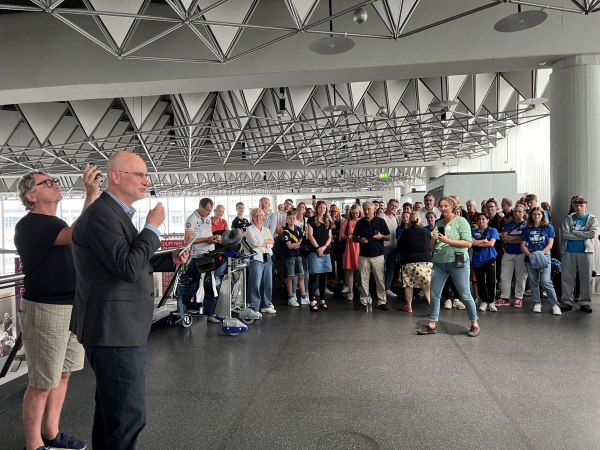
Ambassador Hawke farewells the students at Frankfurt Main Airport.
-
Māori and First Nations people connect during University of Toronto visit
18 indigenous students and two indigenous staff from the University of Toronto’s ‘First Nations House’ were invited to Aotearoa New Zealand for a week-long visit at Tirorangi Marae at the base of Mount Ruapehu in July.
The purpose of the visit was to enhance cross-cultural understanding between Māori and First Nations and Métis peoples and is significant as empowering iwi and hapū in the international education space is an important Te Tiriti obligation for ENZ, as an Aotearoa New Zealand government agency.
The visit took place during the time of ‘Puanga’ which is when the single star rises higher in the sky than the Matariki star cluster and is recognised by iwi and hapū that can’t see the Matariki cluster from their location.
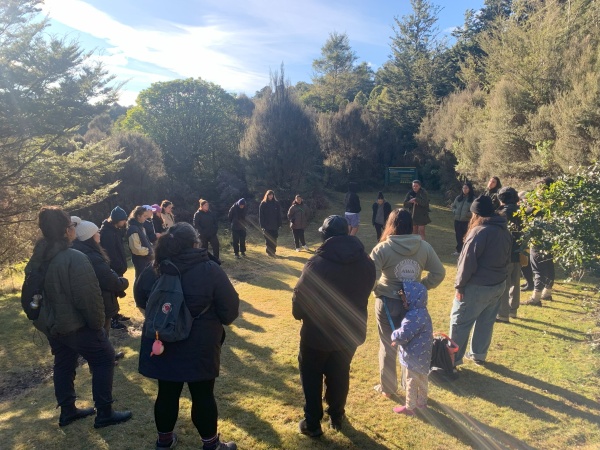
Māori and First Nations and Métis people have ’sharing circles’ as a common way to teach and learn.
The group participated in a wide range of activities in the area while staying at the marae. They were then welcomed to Te Whanganui-a-Tara by the ENZ Wellington office, visiting Te Tiriti o Waitangi at Archives New Zealand Te Rua Mahara o te Kāwanatanga and and Te Herenga Waka — Victoria University of Wellington, before finishing their trip in Whakatū (Nelson) with some adventure tourism activities.
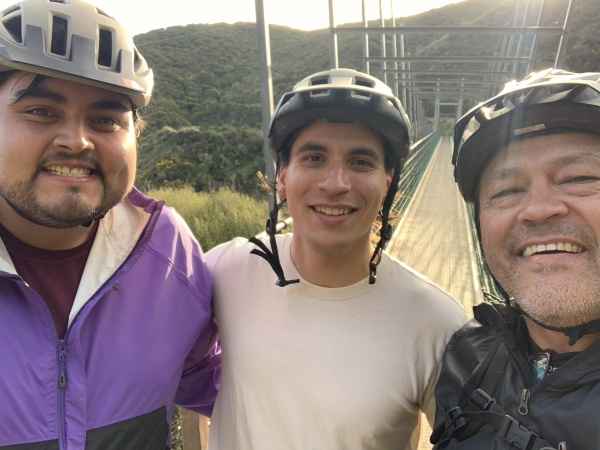
Indigenous students Kieren and Bailey from the University of Toronto sampling Wellington’s outdoors with ENZ's Craig Rofe.
The First Nations and Métis members of the group experienced what living on a marae was like and were also immersed in how a tribe engages with the environment, and how iwi businesses, local council and government agencies such as the Department of Conservation (DOC) operate in the field with iwi partnership.
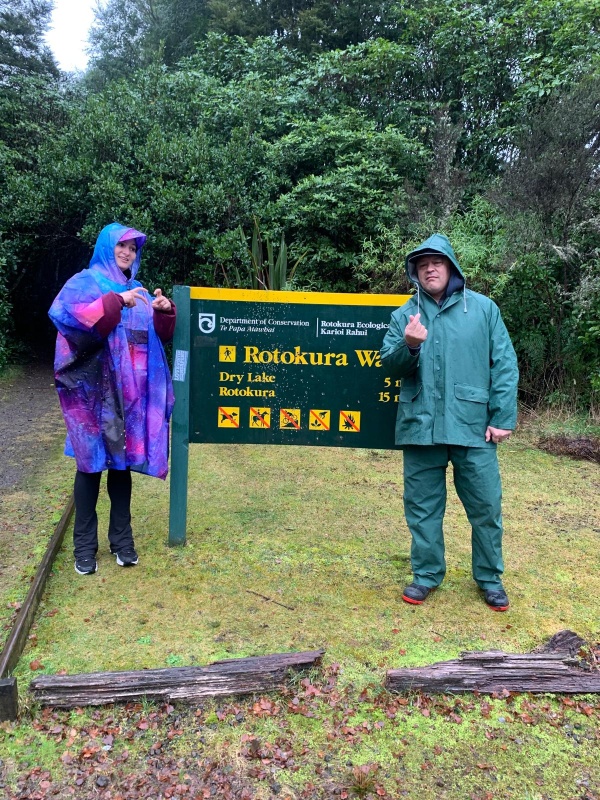
Iwi people sharing lake Rotokura’s healing power, a wāhi tapu (sacred place) for the local tribe.
Dr Craig Rofe, ENZ’s Kaitohutohu Matua Māori – Senior Advisor Māori, said that during the visit, Māori and First Nations and Métis people were able to compare the similarities and differences of their contexts to grow understand of their respective challenges and successes.
“The First Nations people’s struggles to overcome racism and prejudice resonated with tangata whenua, in particular the intentional elimination of language and the current mechanisms of revitalisation.
“Many stories shared with together showed the everyday trauma that resides in each of us and how, as indigenous people, we try to navigate these obstacles to make a better world for the next generation”, said Dr Rofe.
The trip motivated the students to connect more with their languages and culture upon their return.
Kenzie, from the Mohawk tribe said “when we meet again, I’ll be able to talk to you in my language, I’m declaring it!”.
Katherine from the Eskasoni First Nation tribe said “My experience connecting with the Ngāti Rangi revealed the transformative power of global Indigenous connections. Participating in ceremonies such as Hautapu and visiting Mount Ruapehu was particularly moving. Listening to their stories of ancestral ties to the land and taking part in traditional ceremonies that emphasized community and connection to the environment deepened my own personal understanding. This experience inspired me to initiate conversations with elders in my own community about our traditional land management practices.”
This experience also highlights the important offerings that Māori, and indeed indigenous knowledge, has to offer to international education. In particular, and not exclusively, the deep connection that indigenous peoples have with the environment and therefore natural obligation of care.

First Nation student, Alexis, discovers the origins, medicinal, spiritual and mechanical properties of harakeke (flax).
Sustainable practices and programmes can benefit from indigenous inclusion and perspectives, especially with the large-scale impacts of global warming and general pollution in many countries. The co-governance structure that Ngāti Rangi iwi and DOC work with as part of post Te Tiriti Settlement was used as an example of decolonised solutions within our New Zealand context.
There have been discussions between ENZ, Ngāti Rangi iwi, and the University of Toronto about an ongoing relationship and considering what a reciprocal engagement might look like moving forward.
Nāku te ika i hī, nāku anō i whakatau
Ki te haere, whāia i te Pare-i-te-taitonga, tērā taku ika.
This is a Ngāti Rangi iwi reference to the Ruapehu mountain being the ‘pillar post’ of the ‘Fish’ (North Island).
-
Executive team
Amanda Malu | Chief Executive
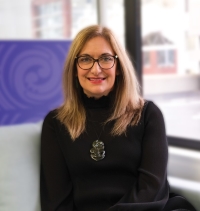 Amanda Malu is the Chief Executive of Education New Zealand Manapou ki te Ao (ENZ).
Amanda Malu is the Chief Executive of Education New Zealand Manapou ki te Ao (ENZ).Amanda has deep experience in the public sector, education, and marketing, as well as experience across borders and with international education through her past roles. She has held senior leadership roles across education and health sectors.
Prior to ENZ, she was Deputy Chief Executive Service Delivery at ACC, and formerly Chief Executive at Whānau Āwhina Plunket, leading the organisation through extensive change over five years in the role. She has also held senior marketing and communication roles, including at the Tertiary Education Commission and in the vocational education sector.
As ENZ’s Chief Executive, Amanda is responsible for leading ENZ in promoting Aotearoa New Zealand as a study destination and helping our country realise the social, cultural, and economic benefits of international education.
Julia Wootton | Group General Manager, Strategy, Capability & Performance
 Julia has 25 years of experience in the New Zealand public sector, where she has held senior leadership roles accountable for planning and performance, enabling services, service delivery operations, transformation programmes, and regulators.
Julia has 25 years of experience in the New Zealand public sector, where she has held senior leadership roles accountable for planning and performance, enabling services, service delivery operations, transformation programmes, and regulators. Julia leads the ENZ teams responsible for strategy, governance, accountability and performance, business planning, people and capability, information technology, property, security, risk, data and insights, and finance.
She is passionate about using her understanding of organisational architecture and effective enterprise systems to create settings that enable people to thrive and contribute at their best. Her aim is to ensure ENZ has the right direction, capabilities, and enablers to maximise the impact of its activities and support the international education sector to grow and prosper.
Julia values education and continuous learning and holds a Master of Business Administration and an Executive Master of Public Administration from Te Herenga Waka – Victoria University of Wellington.
Sahinde Pala l Group General Manager, International & Sector Engagement
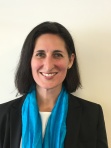 Sahinde joined ENZ in 2016 after 18 years working for a multinational group of English language schools. With a career dedicated to international education, she brought extensive private sector experience in international marketing, stakeholder engagement and student experience delivery to the organisation.
Sahinde joined ENZ in 2016 after 18 years working for a multinational group of English language schools. With a career dedicated to international education, she brought extensive private sector experience in international marketing, stakeholder engagement and student experience delivery to the organisation.Sahinde has held a number of roles at ENZ working with education providers, government stakeholders, regional groups, peak bodies, students’ associations and community groups. She was heavily involved in developing the International Student Wellbeing Strategy.
Sahinde is based in our Auckland office and spends her time outside of work standing on the sidelines of sports fields supporting her young boys.
Anna Gestro | Group General Manager, International Marketing, Brand & Scholarships
 Anna leads the strategy, delivery, and teams behind ENZ's global marketing, brand, and scholarships — focused on connecting students with opportunity and Aotearoa with the world. Her focus is on elevating Aotearoa's global brand, deepening student connection, and driving growth through impactful storytelling and strategic partnerships.
Anna leads the strategy, delivery, and teams behind ENZ's global marketing, brand, and scholarships — focused on connecting students with opportunity and Aotearoa with the world. Her focus is on elevating Aotearoa's global brand, deepening student connection, and driving growth through impactful storytelling and strategic partnerships.Her career spans over 20 years across marketing, strategy, and executive leadership in both public and private sectors. She has worked across global brand and commercial programmes for organisations such as Lion, Fonterra, and New Zealand Cricket — blending deep consumer insight with strategic delivery. Anna’s experience also includes international roles in Singapore and New York, where she’s helped promote New Zealand’s innovation, values, and capability globally.
Anna is also a board member of Basketball New Zealand, where she brings her commercial and strategic expertise to the development of sport. Across both sport and education, she sees a common thread: the power to unlock opportunity, level the playing field, and connect people across borders and backgrounds.
-
Meet the Brazil expert
Ana took the opportunity to clarify the recently-introduced – and then removed – tax on international education fee transfers and gain insights from Maura on New Zealand’s competitive advantage in the Brazil market.
Ana: What is the Brazilian Educational and Language Travel Association (BELTA) is and what does it do?
Maura: BELTA is a non-profit organisation that works across Brazil. Launched in 1992, it was the first association working in the field of international education in Latin America. Today, BELTA agencies represent 75 percent of Brazil’s international education market. These agencies are committed to promoting, facilitating and delivering education and exchange services (educational and cultural programs of all kinds and for all ages, courses, internship and volunteer work programs), in Brazil and overseas. BELTA is often asked to share its experiences with other countries to help them organize their own associations.
Besides promoting Study and Exchange Travel, BELTA monitors the standard of services offered by its associated companies, evaluating their performance from both a student and international partner organisation perspective. Only agency partners of the highest integrity and who agree to abide by the Association’s Social Statute and rigid Code of Ethics are allowed to join BELTA.
Along with the Board of Directors, I am responsible for ensuring BELTA functions correctly, and for representing the Brazilian market to international government and education entities. BELTA is a member of the Federation of Agencies Associations, and I am its president for the next four years.
The income tax on international transfers relating to educational purposes (such as student exchange programmes) has recently been in the news. The Brazilian government has now announced that it will not charge those transfers. Would you clarify and comment on that?
At the start of January the Brazilian government decided to end the tax exemption for payments due abroad. The proposed rate for the new tax was between 6.38 percent and 33 percent. Fortunately, on 26 January 2016, the Department of Federal Revenue published that study abroad programs would be exempt from the new tax.
Brazilian students are now able to plan their international exchange programs with the knowledge that they will not have to pay this tax. This good news for our New Zealand partners!
We know the weakening of the Brazilian Real in relation to the American dollar and the Euro has had an impact on the demand for education abroad to those destinations. Do you believe that New Zealand may be a more desirable study destination in the current economic scenario?
New Zealand has a big market in Brazil because of the favourable exchange rate and the high quality of the education. The opportunity to work while studying is also very appealing for Brazilian students. All of these conditions combined places New Zealand in a special position as a destination for the Brazilian student.
Brazilian students are looking for qualifications that will help them succeed in the challenging job market. They are looking for postgraduate and specialized programs that will position them well in the job market, when the Brazilian economy is back on track. New Zealand is well-placed to fulfil this demand.
What’s your connection to New Zealand? What’s your view of New Zealand as an education destination for Brazilian students and what advice you would give to NZ institutions wanting to attract Brazilian students?
I have visited New Zealand as part of my job, visiting a range of education institutions. I have also had the opportunity to visit the country with my family as a tourist. It offers great education and lifestyle opportunities for students and fantastic tourism experiences.
Students are able to live in a very safe environment, can choose from a great variety of high quality institutions and subject areas, in all kinds of cities or towns. And all within a country with beaches and mountains, fields and farms, with very hospitable and well-educated people.
New Zealand is a top education destination and I love its people! This is my very personal opinion!
Institutions wanting to receive Brazilian students should:
-
offer high quality academic programmes and excellent facilities, including accommodation
-
work with high-quality agencies
-
promote the school regularly throughout the year
-
offer good advice on visa processes
-
be open and understanding to the cultural differences between New Zealand and Brazil.
Find out more about BELTA at http://www.belta.org.br/
-
-
Malaysian student teachers value NZ experience
While it was not much money, it motivated them, according to Mdm Anis Abdullah, co-ordinator of the Kiwi Experience Project at the Institute of Teacher Education (Batu Lintang) in Kuching, who accompanied the students.
Over the next year they raised their target of 100,000MYR or $NZ 30,000. That first day they rented out the bikes for less than 1 ringgit – so the fact there were 12 takers was the incentive to continue.
During the March visit to Dunedin the third-year primary-level English language student teachers gained insights into New Zealand culture, education techniques, ways of managing pupil behaviour and various literacy programmes. The tour ended with the students performing three songs, including a waiata, at North East Valley Normal School.
Aged 21 to 25, many will be posted in rural areas with added responsibilities as school administrators and for pastoral care of pupils. “English is part of the curriculum in both primary and secondary schools now but in 2016 it will become compulsory and pupils will be required to pass English language studies to graduate from high school,” according to Mdm Anis.
She said the trip enabled the students to have the total Kiwi experience. “I believe in the holistic approach to education where learning entails much more than just what you study in class. Trips like this enrich an education. New Zealand is the most expensive benchmark option for us, but it is the best because we would like our students to see first-hand how the early literacy and reading recovery programmes are carried out here. Besides, New Zealand is a very beautiful and safe country and the warmth of the Kiwis always made us feel very welcomed.”
This visit was the first time some had left their home region of Sarawak. “They have had a great time and many said that when they graduate and have worked for a few years, they will come back.”
Mdm Anis said commonalities existed between the Malaysian and New Zealand teaching ethos. “It is about teachers being informed, knowledgeable and global citizens. Our teacher development programmes focus not only on intellectual aspects, but also on developing values and the emotional, spiritual and physical aspects – similar to the ‘life-long-learner’ concepts in New Zealand.”
Mdm Anis hopes the Malaysian Ministry of Education will plan another twinning programme for Malaysian students to study at the University of Otago, possibly at Masters level. She previously helped co-ordinate such a programme at the institute where she works, that ended in 2013, for 117 student teachers to complete half of their Teaching English to Speakers of Other Languages, TESOL, degree at Otago.
-
eVisas and VisaView coming soon
From 7 December, eVisas (passport-free applications and label-less visas) will be available for many students who apply online, joining the one thousand applicants who are applying for visas electronically every week through Immigration ONLINE.
At the same time, New Zealand education providers will become able to use Immigration New Zealand’s VisaView service to check whether a non-New Zealand student can study with them.
eVisas
INZ will extend eVisas to the following online applicants:
-
People applying in New Zealand to renew their Work, Visitor and Student visas (except Chinese nationals)*
-
People from visa-waiver countries applying outside New Zealand for a Work, Visitor or Student visa (citizens of visa-waiver countries do not need a visa to travel to New Zealand as a tourist for less than three months).
These applicants will not have to send in their passports to INZ when they submit their applications online. The visa holder will receive their visa approval notification through their Immigration ONLINE account, and may print their visa record from their account. This notification contains visa details, including travel and other visa conditions.
Visa holders are advised to carry their visa approval notification when they travel. Online systems allow airlines to confirm that a person can travel to New Zealand, but the visa approval notification can be used as an additional confirmation if requested.
Further information about eVisas is available at www.immigration.govt.nz/eVisas
Visa transfer to new passports
Because visa details are linked to passports, people who obtain a new passport after being granted their visa need to transfer their visa details to their new passport. There is potentially a greater risk with eVisas that visa holders may neglect to transfer visa details to their new passports. For explanation of how to transfer visa details, see here.
VisaView
VisaView is an online visa enquiry system that is being extended to education providers from 7 December 2015. It will enable providers to check whether a non-New Zealand citizen can study with them.
VisaView is currently used by employers to check migrants’ eligibility to work in New Zealand.
What happens next?
We will email education providers when VisaView is launched, with a link inviting them to register for a VisaView account. A detailed user guide will be available.
There will be some opportunities for education providers to attend face to face training sessions in a few centres during December and early February.
* INZ is liaising with Chinese authorities and plans to implement eVisas for Chinese nationals during 2016.
-
-
Around the world in five
INDIA
Watch for shifts in Indian outbound this year
India has become a key sending market in international education. However, Indian students’ choice of study destination is highly influenced by visa policy and the availability of post-study work opportunities. Recent developments in the US and the UK have called their continuing appeal into question, opening the door for other destinations to claim a share of the market. So where will these students go?
MALAYSIA
Many students in fields that don’t interest them
At least one in three Malaysian students is pursuing a degree that doesn’t suit his personality or character traits, according to an international recruitment agency. The agency suggests that the mismatch between character traits and qualifications was one of the main reasons that Malaysia had a high number of unemployed graduates – 200,000 in 2016, according to the Malaysian Employers Federation.
CHINA
Schools develop global vision in students
In Hangzhou, education authorities are encouraging schools to adopt an international outlook and curriculum. Next month, 30 local elementary and middle schools will officially be models in international student exchanges, global relations and the employment of teachers from abroad. By the end of this year, the city hopes to have 80 schools in that designation.
CANADA
Campaign launches to spur #LearningAbroad
The Canadian Bureau for International Education has rolled out a nationwide campaign, Learning Beyond Borders, to encourage students to study abroad. Just 2.3% of university students studied abroad in 2014/15, but research suggests a much higher number of students are interested in studying abroad. Already, 87 education institutions have signed up, committing to removing barriers such as funding and credit transfer.
GLOBAL
Study zones: Find out the best cities in the world for international students
The annual ‘Best Student Cities’ list by Quacquarelli Symonds (QS) table ranks 125 cities on a number of measures including student satisfaction, affordability, university rankings, employer activity and more. The list highlights Montreal, Canada as the number one location, pushing Paris into the second place. For the first time, New Delhi and Mumbai feature among the top 100. Auckland is ranked 28, and Christchurch is ranked 74.
-
Around the world in five
BRAZIL
Brazil’s study travel market bounces back
A recent survey shows Brazil’s outbound study surged by 14% in 2016, with students’ priorities shifting in terms of preferred programs of study, driven largely by employability factors. As such, language programs remained the most popular option, as speaking an international business language is seen as “essential” for students in the country.
US
Internationalisation and student recruitment increasing among US colleges
A new study of US colleges found nearly 30% of respondents reported high levels of international activity within their institutions, compared to 21% in 2011. When asked why, US colleges cited “improving student preparedness for a global era” as their main motivator, listing key activities such as “increasing study abroad for US students”, “recruiting international students” and “partnerships with institutions.”
CHINA
Hong Kong’s education system needs more heart and ‘soulware’
How can China best equip its next generation with the skills needed for a rapidly changing world? City University (CU) might have the answer. Despite being a young university with many students from lower-income families, it has made its way into the top 50 in the QS World University Rankings. CU President Way Kuo said the key is “soulware”, and has established regular exchange programmes with overseas universities to allow students to study abroad and “open their minds”.
UK
‘Widening gap’ between London and rest of country in language GCSEs
A widening gap is emerging in the take-up of language GCSEs between pupils in London and the rest of the country, a new report has warned. London is the only region in the country where the percentage of pupils taking language GCSES has risen over the past three years, possibly a result of the many multi-lingual pupils there normalising the ability to learn other languages.
INDIA and BRAZIL
Still a long way to go on internationalisation
India and Brazil are the largest higher education systems in the world in terms of numbers of students (alongside China and the United States) and the largest developing economies after China. While both nations have a long way to go, some important developments should be noted, including growth in scientific outputs and funding for public institutions.
-
Japan events bring growth and connections
Although this was the third year the fair has run, ENZ’s Senior Market Development Manager – Japan, Misa Kitaoka, noted a prevalence of tertiary students this year, often seeking degree programmes.
"While Japan hasn’t traditionally been a study-to-work market, concerns over employment outlook as well as anxieties over life in retirement with the declining population could be encouraging the Japanese to pursue new options to secure their future,” she said.
The fair attracted a record 550 visitors, including 340 students, and 37 New Zealand providers.
As destination marketing plays a key role in student attraction to New Zealand, ENZ received support from Tourism New Zealand and Air New Zealand for the fair, and also welcomed Tobitate! (Leap for Tomorrow) Study Abroad, led by Japan’s Ministry of Education, Culture, Sports, Science, and Technology (MEXT), as the official supporter for the fair. '
“MEXT’s support is an endorsement of ENZ’s 3-year operation in Japan, and a testament to our 10% market growth in 2016,” said Misa.

ENZ’s Sam Heeney, Tomoko Nishikawa from Tobitate Office and Misa Kitaoka.
A representative from the Tobitate Office gave a presentation during the fair, explaining the application procedures and encouraging students to apply for the scholarship to study in New Zealand.
The presentation was followed by a panel of three Tobitate alumni who shared why they chose to study in New Zealand.
In conjunction with the fair, ENZ hosted two education seminars in Osaka and Tokyo, with a record 164 education agents and institutions attending. For those that sought to expand their existing network, SIEBA’s presence was much appreciated as it introduced standardised contracts, as well as services including primary and secondary student placements.
Education seminars have been increasingly popular amongst school teachers looking to send students and student groups to New Zealand secondary schools. This initiative is driven by the Japanese government’s push for internationalisation ahead of the 2020 Tokyo Olympics and Paralympics.
Julie Haskell, Director of International at the University of Auckland English Language Academy (ELA) has attended ENZ events over the last three years.
“Attending these events has helped ELA to identify new business opportunities as well as developing existing partnerships,” she said.
“We look forward to attending future events in Japan.”

